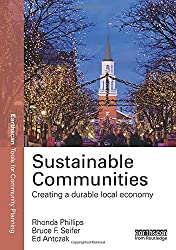 In a recent podcast with Michael Shuman discussing local economies, Shuman praised the progress made in Burlington, Vermont over the past 25 years -- largely led by a local activist named Bruce Seifer who co-authored the book Sustainable Communities: Creating a Durable Local Economy. This caught the attention of a number of PeakProsperity.com readers and, at their request, we invited Bruce to speak specifically about the urban revitalization he has helped bring about in Burlington, and what other communities can learn from that model.
In a recent podcast with Michael Shuman discussing local economies, Shuman praised the progress made in Burlington, Vermont over the past 25 years -- largely led by a local activist named Bruce Seifer who co-authored the book Sustainable Communities: Creating a Durable Local Economy. This caught the attention of a number of PeakProsperity.com readers and, at their request, we invited Bruce to speak specifically about the urban revitalization he has helped bring about in Burlington, and what other communities can learn from that model.
In a nutshell, Burlington's success is due to:
- beginning with a data-driven understanding of what local needs are most important to meet
- creating a clear, long-term vision of the developments efforts that will be required to meet these needs
- electing leaders who can inform and inspire the populace
- empowering and encouraging local citizens and businesses to participate in reaching the goals
- making smart trade-offs (e.g. investing in efficiency before and/or instead of new infrastructure)
- maintaining clear transparent 2-way (top-down & bottom-up) communication throughout
I recently looked at the Bureau of Labor Statistics unemployment rate, something I used to track when I worked for the city for 28 years. They have 372 municipal regions where they track the unemployment rate, which is one factor of many that you look at when you're looking at an economy. And, Burlington has the fourth lowest unemployment rate in the United States currently, out of 372 municipal regions. We were usually in the top two percentiles of the unemployment rates for many years, but it’s gotten even better.
Another piece of information that we tracked during the Great Recession that we as a nation felt, and we had the lowest foreclosure rate of any city in the United States, which mean that people’s net worth didn't shrink like many cities around the United States where people lost their house value. So, those are two pieces of information.
The other one we look at is our vacancy rates for commercial buildings in town and whether or not there are vacant buildings. Basically, there are virtually no vacant commercial buildings, so the vacancy rate is extremely low. Companies now want to be in Burlington and want to grow in Burlington, But that wasn’t always the case...
Some of the lessons learned is that vision is important, but you have to create the capacity to implement the vision. And, we felt that development created with the principles, with a priority for sustainable development was important. One of the things that we learned, that was one of the big lessons we learned in about 1993 was to serve the people in your community first by building facilities for yourselves and then other people will come.
The other thing that we did, which is not rocket science but it’s pretty much behind everything that we did, is pretty simple. We asked people in need what they needed and then we tried to figure out how to meet their needs. We were more like a gardener for small businesses. We’d focus on small businesses and try to find ways to help them grow to become major employers and economic players. So, we did things…you know if they needed financing we ended up starting a small business loan fund. If they needed training around understanding finance, we set up training programs for them. Sometimes they said they’d like to work with other like type of businesses and learn from each other. So we would set up trade associations working in concert with them. You know, we would tend to them over the years. We provided ongoing technical business advice to those business people so if they had an issue on getting a permit or they had problem with sewer overflow or whatever it may be, we were always there trying to solve their problems. As a result of all of that, we ended up helping a lot of small companies become bigger companies.
Part of what you're talking about is also, we had political leaders that were able to articulate the shared values of people. And by doing that, people felt empowered to make things happen and become…they become unstoppable. So, there was a whole range of things that we were doing, but it was really listening to the public and responding to their needs. And also, identifying weaknesses within our community, and we did that through a long-term economic development plan
Click the play button below to listen to Chris' interview with Bruce Seifer (48m:20s):
This is a companion discussion topic for the original entry at https://peakprosperity.com/bruce-seifer-creating-a-durable-local-economy/